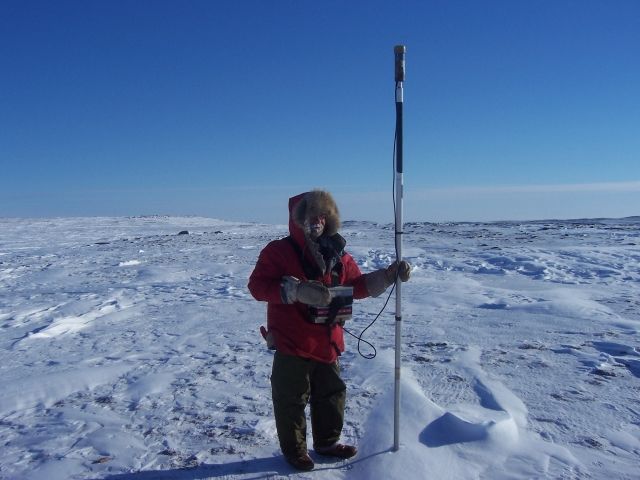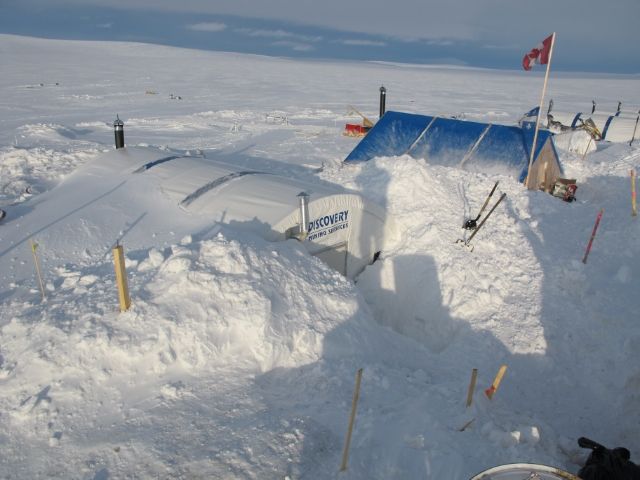Some questions for you Qayaq. Your posts got my mind to wondering. Feel free to answer or ignore as many as you'd like.
Is what you're doing (surveying) taking place year round up there or just in winter? If mainly during winter, why? I see in a later post you mentioned an ice runway for large planes, which I suppose would be difficult in summer. Any other reasons? Is it actually easier to get around in winter?
How many of you are there and for how long? Do you stay in one location all season or do you move? How long do you stay in one place?
If you're clearing a runway on the ice you must have some heavy equipment available? If so how is it stored and where is it worked on? I'd think you'd almost need a more permanent facility for that but the other lodgings you showed look more temporary (a few seasons?) and I'd think if there were permanent facilities for equipment you might has well have better lodgings as well. Or perhaps there is a permanent base for large equipment and what you're picturing are just small outposts?
What do you use for a fuel source?
Is there any life around other than you this time of year?
Thanks,
Alan
In the eastern arctic our programs generally run from late February till mid September. Earlier than February and the daylight hours aren't long enough to get much production. By mid September the weather really starts to crap out with snow and fog. It doesn't help that we are right next to what's left of the Barnes ice cap, which adds a whole other level of poor weather. We get around mostly by helicopter. The machine we have here now is an A-Star B3 which has an operating limitation of -40 degrees. Since it's been colder than that most of the time this month we've been limited in our flying time. In order to get our runway built in time to bring the Herc in, hopefully in February, we started the process in early December. We also use snowmobiles if we're travelling within about 30 kms of camp.
There are 10 of us in camp including the cook, pilot and engineer. I usually work 42 days and then have to take 14 days off according to workers compensation rules. Others stay between 28 and 42 days. We have another similar camp 12 kms to the west of us and we'll open it once the Herc gets in. Most of the work for the drill will be close to that camp but the lake for the air strip is at this camp. Since there is no winter water supply at that camp we haul water 8 kms, 100 gallons at a time with snowmobile. In summer we sometimes have both camps open, depending on what area of the property we're working on.
We're actually using small Kubota tractors with snowblowers to clear the strip. They were slung out from Iqaluit by helicopter. We also have a small skid steer loader on tracks to break up the snow first. Once the snow is cleared, we'll start flooding the ice with pumps to build ice thickness. Since this is an early stage exploration project, we don't have any equipment storage sheds or facilities for working on equipment. Any repairs are done under a tarp with a "Herman Nelson" diesel heater providing a little warmth. What we have for facilities are 6 sleeper tents, a "dry" which is a tent with a poly water tank and pressure system to supply water to the kitchen and a shower stall, a plywood office, kitchen, outhouse and generator shed. At night we "circle the wagons" with the snowmobilles parked around the Herman Nelson. In the morning we use a car interior heater to warm up a small diesel heater which then warms up the big Herman Nelson to get it going. Then we can warm up the snowmobiles to get them started.
We have a "snowcat" with a blade in Iqaluit that has started to make its way to camp via a 180 km trail. I've been scouting the trail by helicopter when ever we can fly and also taking ice thickness measurements on the several lakes he'll be crossing. Once that machine gets here the snow clearing should progress quite a bit faster.
We have oil stoves in the tents. The sleepers have electronic Toyo stoves which are very fuel efficient, but also very finicky. The kitchen, dry, office and outhouse have Bradley stoves. Since our temperatures have been well below -40, we are having a lot of problems with keeping the oil flowing to the stoves and spend a lot of time dealing with stoves that won't run. The propane for the kitchen stoves is also a problem at these temps. Since the boiling point of propane is -42, it won't pressurize below that so we constantly swap out 100 lb. tanks with spares that we keep warm in the generator tent. It looks a little strange to see liquid propane drip out of the regulator when switching tanks. The stove oil is in 45 gallon drums that we move from a fuel berm to the tents by snowmobile and sleigh.
As far as wildlife, there's very little where we are. There is the odd caribou, arctic fox, arctic hare and ravens. Other birds are peregrine falcons in summer, gyrfalcons, snow buntings and lapland longspurs. We generally have at least one polar bear make it's way into camp every year. We chase them off either with snowmobile or the helicopter.
We just got through 36 hours of 50 kt winds gusting to 60. With the blowing snow, it's a major issue to keep access to the buildings and tents open. As soon as you open a door the snow blows in and fills the jamb so that you can't get the door closed again. The snow comes in so fast that you can't clear it fast enough to get the door shut. It generally takes at least 2 people shovelling and scrabbling with your mitts to try and clear the snow away. Once you get outside you basically crawl and stumble over the drifts that you can't see in the dark and blowing snow to fight your way into your sleeper tent. Last night the wind spun the helicopter 90 degrees and blew it off the plywood helipad. Luckily it was only a 6 inch drop to the snow pack and the engineer determined that there was no damage. We had a brief reprieve this afternoon but the wind is starting to howl again tonight, so hopefully our stove keeps going all night tonight.
It's definitely a challenge!





